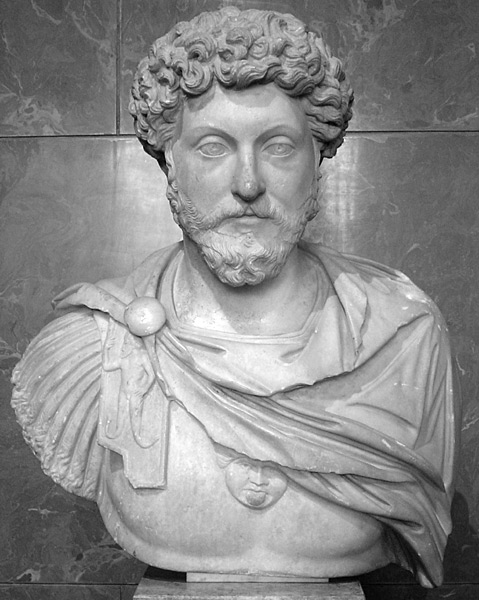

Clifford Thompsom, editor of Current Biography magazine, has an interesting essay in the Fall 2008 Threepenny Review entitled Mingus, Marcus, and Us, where he makes the unlikely connection between bassist and composer Charles Mingus and the Roman emperor and Stoic philosopher Marcus Aurelius; or more precisely, the former's compostion Meditations on Integration and the latter's philosophical work Meditations. Thompson, in part, writes:
I find no evidence that Mingus had Marcus Aurelius (A.D. 121–180) in mind when he composed "Meditations," which shares its title with the classic text by that Roman emperor and Stoic philosopher. In my own mind, though, there is a connection. Marcus was one who believed that there is an order to the universe, established by a good higher power, which he referred to variously as "Nature," "the gods," or even "Zeus." His philosophy, however, seems grounded at least as much in an assumption of hardship as in a belief in the goodness of Nature. (Marcus, who wrote his great work while at war with the barbarians, knew a thing or two about hardship.) For him, Nature and hardship were not conflicting things, or even different things. Just as a medical consultant "has prescribed horseback exercises, or cold baths, or going barefoot...so in the same way does the World-Nature prescribe disease, mutilation, loss, or some other disability," he wrote. How should one deal with hardship, whose forces have one outgunned? Largely through attitude: "Here is a rule to remember in future, when anything tempts you to feel bitter: not, 'This is a misfortune,' but 'To bear this worthily is a good fortune.'" For, in Marcus's view, what is important is not pleasure but how we conduct ourselves, how successful we are at bringing forth the best that is in us, in times of happiness or its opposite—especially its opposite. "Either the world is a mere hotch-potch of random cohesions and dispersions, or else it is a unity of order and providence," he wrote. "If the former, why wish to survive in such a purposeless and chaotic confusion; why care about anything, save the manner of the ultimate return to dust; why trouble my head at all; since, do what I will, dispersion must overtake me sooner or later? But if the contrary be true, then I do reverence, I stand firmly, and I put my trust in the directing Power." Here, some of us would disagree with Marcus, feeling that our conduct should not depend on an order to the universe or its lack. We just might, though, see wisdom in what he writes in another passage: "Be master of yourself, and view life as a man, as a human being, as a citizen, and as a mortal. Among the truths you will do well to contemplate most frequently are these two: first, that things can never touch the soul, but stand inert outside it, so that disquiet can arise only from fancies within; and secondly, that all visible objects change in a moment, and will be no more. Think of the countless changes in which you yourself have had a part. The whole universe is change, and life itself is but what you deem it."
Marcus also wrote that "oneness of feeling exists between all parts of nature, in spite of their divergence and dispersion"—not a bad description of Mingus's compositions. In the beginning of Mingus's "Meditations," the horns and bowed bass intersperse an ethereal melody with a repeated three-note phrase, the near-formlessness of the one bringing to mind primordial mist, the hardness, relentlessness, and unfeelingness of the other suggesting prehistory's great cataclysms—the forming and breaking of continents and other nonhuman events. Later, in wonderful, delicate passages, Dolphy—on flute—and Byard explore the ethereal mode further. Not until nine-plus minutes into "Meditations" do traditional-style solos, with piano/bass/drum backing, begin. In other words, the solos—individuals and their achievements and statements— are not the point here, at least not the whole point. That is true even during the solos: here, the rhythm section does not so much accompany or support each soloist as spar with him—Dolphy first (on bass clarinet), then Byard, Coles, Mingus, and Jordan; of them, only Mingus plays without such adversity. (Do we hear this as rare human triumph, or, since Mingus is otherwise part of the rhythm section, as total domination by external events?) Coles faces a particularly fierce piano/ bass/drum onslaught, and Jordan's solo is subjected to the return of the harsh, insistent phrase from the beginning of the piece. How do the trumpeter and saxophonist hold up? It is difficult to say if they triumph, or even what that would mean; but they are beautiful in the attempt. Not a bad thing to have said of us, when all is finished. Marcus Aurelius, of course, would scoff at our striving for even that modest tribute. "This mortal life is a little thing, lived in a little corner of the earth," he wrote in his own Meditations; "and little, too, is the longest fame to come—dependent as it is on a succession of fast-perishing little men who have no knowledge even of their own selves, much less of one long dead and gone."
1 comment:
Hmmm been looking around reviews about Marcus.....
Post a Comment